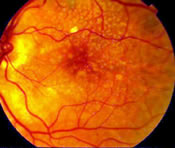 Macular degeneration is sometimes referred to as “aging of the retina.” Macular degeneration causes damage to the macula, which is a small area at the back of the eye that allows us to see fine details clearly.
Macular degeneration is sometimes referred to as “aging of the retina.” Macular degeneration causes damage to the macula, which is a small area at the back of the eye that allows us to see fine details clearly.
How does Macular Degeneration affect vision?
Macular degeneration makes close work- like threading a needle or reading- difficult or impossible. When the macula does not function correctly, we experience blurriness or darkness in the center of our vision. Although macular degeneration reduces vision in the central part of the retina, it does not affect the peripheral vision. For example, you could see a clock but not be able to tell what time it is.
Macular Degeneration alone does not result in total blindness. Most people continue to have some useful vision and are able to take care of themselves.
Treatment and Precautionary Measures
You can check your vision daily by using an Amsler grid. You may find changes in your vision that you would not notice otherwise.
Despite ongoing medical research, there is no cure yet for this condition. Some doctors believe that nutritional supplements and UV protection may slow the progression of macular degeneration, although this has not yet been proven.
Our specialists suggest the following precautionary measures:
- Multivitamin with minerals, zinc and lutein twice a day (consult with your eye doctor if you are a smoker)
- Ultraviolet tint in spectacles
- Diet including increased amount of leafy green vegetables and fruits (consult with your medical doctor if you are on a blood thinner such as Coumadin)
- Controlled blood pressure
- Discontinue smoking

